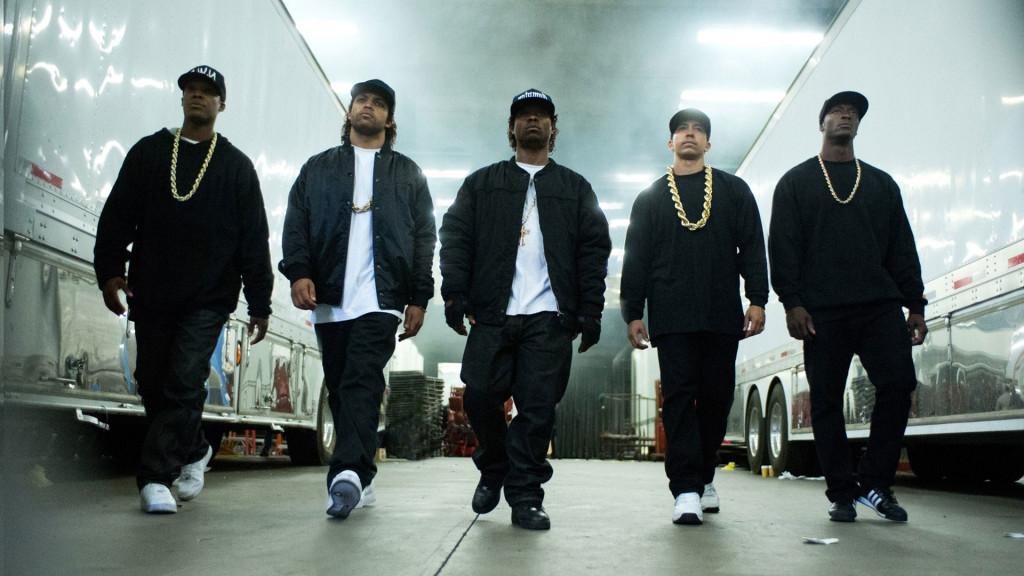Hundreds of people rhythmically gyrate to the disc jockey’s hardcore beats as a group of rappers trade rhymes that diss law enforcement officers, unaware that local authorities are approaching the stage with badges held high. Gunshots suddenly ring out and mass pandemonium quickly ensues, bringing the concert to an abrupt end. The rappers attempt to escape, only to be seized and thrown into the back of a police van as enraged concertgoers begin chanting a now-iconic phrase: “F— tha police! F— tha police! F— tha police!”
Filled with just the right amount of action, drama and raw emotion, “Straight Outta Compton” paints a striking picture of a musical supernova’s meteoric rise and dramatic fall, while simultaneously celebrating a critical turning point in the history of hip-hop music. Borrowing its title from the 1988 N.W.A. gangster-rap album of the same name, the film follows five friends from Compton, California — Ice Cube (O’Shea Jackson Jr.), Dr. Dre (Corey Hawkins), Eazy-E (Jason Mitchell), MC Ren (Aldis Hodge) and DJ Yella (Neil Brown Jr.) — as they attempt to channel their respective frustrations into music and, in doing so, revolutionize the industry. With guidance from music manager Jerry Heller (Paul Giamatti), the group soars to the top of the charts only to get caught up in a downward spiral that threatens to destroy everything they have worked to accomplish.
Reminiscent of Tate Taylor’s 2014 film “Get on Up,” which chronicled the career of singer-songwriter James Brown, “Straight Outta Compton” brings to life a harrowing journey of overcoming seemingly insurmountable obstacles in an era when ethnic minorities were, and still are, regarded as different because of their skin color. Unlike Taylor, however, director F. Gary Gray takes a grittier approach to the biographical film. Layering images of wild parties and sold-out concerts over archival footage of police brutality and civil unrest, Gray manages to create a mirror of the music industry and American society in general: glamorous on the outside, but with an undercurrent of secrets and lies lurking beneath the surface. This imbues the film with a rarely seen sense of honesty, allowing viewers to go behind the curtain and witness firsthand the events that defined the racial tensions of the late 20th century.
The cast is nothing short of superb. Jackson shines as Ice Cube, standing out through a level of intensity that constantly moves the plot forward. Additionally, Hawkins gains sympathy from the audience by adding an emotional side that develops along with the relationships within the group. Mitchell, Hodge and Brown provide moments of comedy throughout the film, not only further engaging viewers in the story, but also allowing them to catch their breath and briefly reflect on what has occurred before diving back in.
The one particularly noteworthy performance is that of Giamatti, whose character is dubious and nothing short of vile. He captures the image of the unscrupulous businessman, primarily when he tells Ice Cube the contracts are still being written despite the fact that Eazy-E has already received his, immediately giving viewers a reason to hate him. Although Jerry Heller may be far from physically imposing, his deviousness is enough to make Ice Cube watch his back.
Perhaps the film’s most compelling element is the real-life city of Compton, which is depicted as an urban jungle where no one is to be trusted and no place is considered safe. Scenes of nightly drug raids and unnecessary arrests add to the visual impact, with several shots tightly framed on graffitied walls and dilapidated ranch-style houses. By choosing to have the movie shot on location, Gray makes audience members feel like they are thrust into the middle of a battle against the growing crack epidemic and former President Ronald Reagan’s War on Drugs.
Unfortunately, the flaws are not negligible. The second half of the film tends to focus more on the individual drama within the group, such as Eazy-E’s struggle with HIV and Ice Cube’s highly controversial diss-track “No Vaseline,” which fails to match the tension that stemmed from the film’s opening sequences. Consequently, Dr. Dre’s interactions with record producer Suge Knight (R. Marcos Taylor) come across as tedious and boring. Taylor initially builds his character up as a sadistic bully who enjoys doing whatever he wants, but it feels as though he has no personality when he’s not taking pleasure in causing pain.
Despite these obstacles, “Straight Outta Compton” is still a film worth seeing. Both diehard N.W.A. fans and general audience members will greatly appreciate the direction Gray chose to tell the group’s inspiring story — one that reveals the history of music’s greatest legends and how far they went to speak the truth.




















